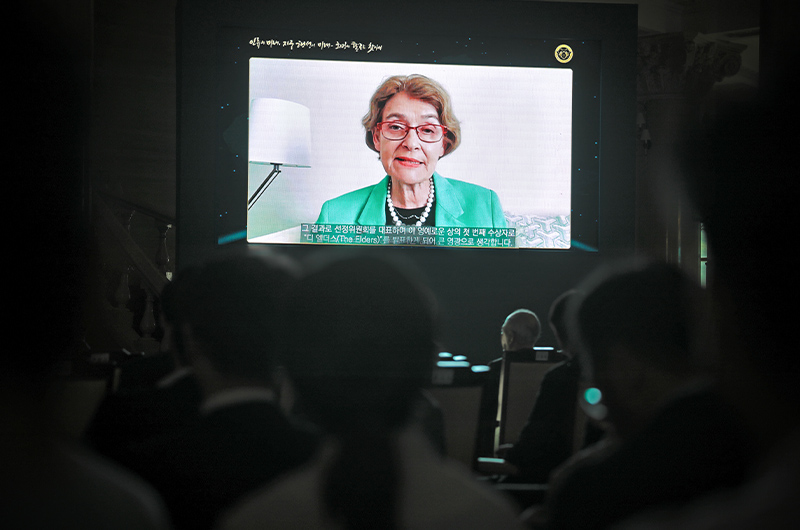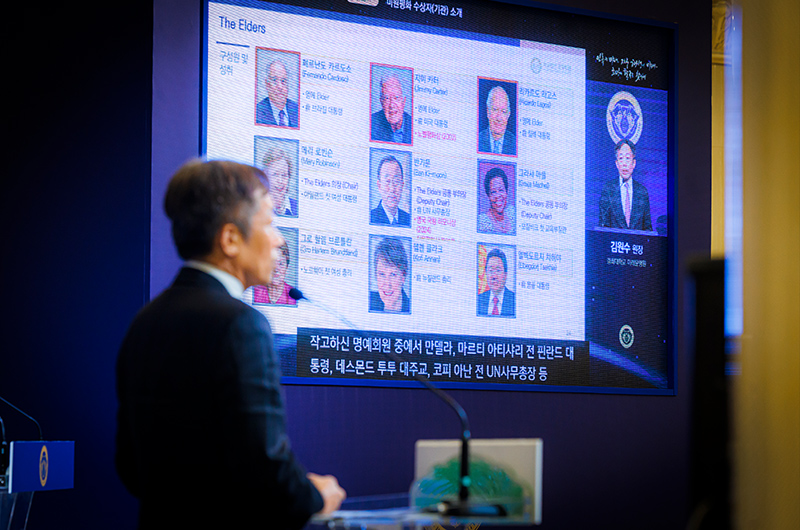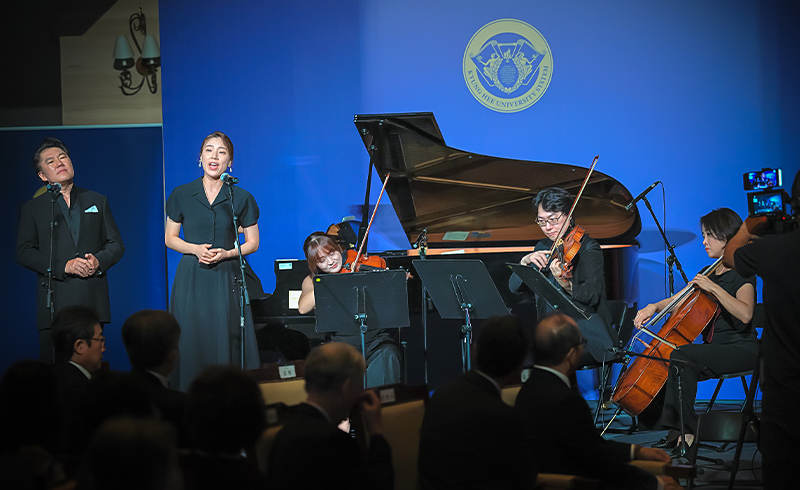header
News
The Future of Humanity, The Future of Planet Earth: In Search of Our Common Hope
- WRITER 학무부총장실

The announcement of the winner of Miwon Peace Prize at the Peace BAR Festival 2024 on the 43rd International Day of Peace
The Inaugural Winner of Miwon Peace Prize: The Elders
Chancellor Inwon Choue: “We must open a global horizon of consciousness and practice from a holistic, Chonil perspective”
The Kyung Hee University System, birthplace of the United Nations International Day of Peace, has taken a significant step forward by mustering the wisdom of reflective transformation and actionable practices to address this era of crisis and to inspire a new wave of peace. On September 20th, at the Peace BAR Festival (hereinafter referred to as PBF) commemorating the 43rd anniversary of the UN International Day of Peace, Kyung Hee announced the first recipient (organization) of the Miwon Peace Prize: The Elders, a British non-profit organization.
In his commemorative speech under the title, “Facing Transformative Challenges: Thoughts on the Holistic Understanding of Our Times,” Chancellor Inwon Choue of the Kyung Hee University System voiced grave concerns over the alarming complacency of the international community and current politics in their failure to actively respond to increasingly urgent existential threats. He urged citizens to proactively engage with these issues and take preventative action. Chancellor Choue emphasized, “The solution to the problem must begin with civic consciousness, the foundation of politics and public sentiment. Individual citizens need to recognize and engage deeply with these global challenges. From the holistic perspective of an open world, the task of opening up a global horizon of consciousness and practice rooted in the perspective of Chonil could be the Survival Imperative for all who face this era of crisis. This may well serve as an axis of history that advances new agendas for peace.”
The Kyung Hee University System established the Miwon Peace Prize, striving for a better future of peace
Kyung Hee annually hosts the PBF to commemorate the International Day of Peace. On September 20th, 2024, this year’s commemorative ceremony started simultaneously online and offline at the Grand Peace Hall and broadcast as a live webcast. The World Peace Week was declared until the 26th, and various events were held involving future generations, scholars, and civil society members. The theme for this year’s PBF was “The Future of Humanity, The Future of Planet Earth: In Search of Our Common Hope.” The ceremony proceeded in the following order: △Report on the progress of the establishment of the World Peace Day and the Miwon Peace Prize △Screening of the Miwon Peace Prize commemorative video “Peace, in search of its beautiful source” △Announcement of the winner (organization) △Introduction of the winner (organization) △Awarding of plaques of appreciation (Kyung Hee International Foundation and Miwon Peace Prize Sponsorship Foundation) △Commemorative speech △Commemorative concert.
The International Day of Peace (September 21st) and the International Year of Peace (1986), established by the United Nations in 1981, marked a significant milestone in the annals of human pursuit of peace. Amid the Cold War’s escalating nuclear tensions, these revolutionary initiatives opened a new era of détente between East and West with the announcement of the International Year of Peace. On January 1st, 1986, U.S. President Ronald Reagan and Soviet General Secretary Mikhail Gorbachev exchanged New Year’s messages of peace. Afterwards, the tensions of the Cold War gradually eased as the two countries agreed in principle to end the posture for nuclear war and successfully concluded a series of disarmament talks. For this reason, the International Day and Year of Peace are considered to be one of the key catalysts that ended the Cold War. The initial idea which kickstarted the snowball effect that eventually culminated in the establishment of the UN World Day and Year of Peace came from Dr. Miwon Young Seek Choue, founder of the Kyung Hee University System.
The Kyung Hee University System established the Miwon Peace Prize to honor the legacy of Dr. Young Seek Choue and to support aspirations for a better future of humanity in peace. Madame Irina Georgieva Bokova (former Director-General of UNESCO and Chair of the Miwon Peace Prize Selection Committee) underscored the significance of the Miwon Peace Prize. She said, “Global community today faces a multitude of complex, interconnected crises such as climate change, the resurgence of nuclear threat, environmental degradation, and a decline in cooperative international politics. These global challenges shake the very foundation of our civilization. Since achieving and preserving true peace is a shared responsibility of all people on Earth, Dr. Young Seek Choue dedicated his life to building harmony and peace within the global community, grounded in the philosophy of universal cosmic principles. The Miwon Peace Prize stands as a testament to humanity’s unwavering commitment to peace, coexistence, and hope for the future.” Madame Bokova then announced the recipient (organization) of the inaugural Miwon Peace Prize.

The Elders, presenting the need for a paradigm shift in the pursuit of comprehensive global peace
The inaugural Miwon Peace Prize was awarded to The Elders. Founded in 2007 by former South African President Nelson Mandela, they are an independent, non-profit organization comprised of current and former world leaders. At the time of its establishment, former President Mandela emphasized “collaboration between experienced and independent leaders to resolve complex problems facing the world.” The Elders has been carrying out various activities to address global problems, advance human rights, and promote peace with the vision of “a world where people live in peace and recognize their common humanity and shared responsibility for the planet and future generations” in “a world where all human rights are universally respected, poverty is eliminated, and people can realize their true potential free from fear and oppression.”
Despite security risks, the Elders has been actively present in main theatres of conflict working directly to alleviate tension and restore peace. When necessary, it has courageously confronted power and oppression to offer truth and wisdom and continued to speak authoritatively in the matters of global conflicts and challenges. The Elders has also become a leading voice calling for a paradigm shift in practical efforts to affect comprehensive global peace, advocating universal human rights and public health, and warning against climate crisis, threat of nuclear war, and dangers of unrestrained new technologies.
The Elders is headquartered in London, UK, and currently chaired by former Irish President Mary Robinson. Graça Machel, wife of former President Mandela, and former UN Secretary-General Ban Ki-moon are co-vice-chairs. The distinguished members of The Elders include Nobel Peace Prize laureates, such as former President Nelson Mandela, former President of Finland Martti Ahtisaari, Archbishop of Cape Town, South Africa Desmond Tutu, former UN Secretary-General Kofi Annan, former US President Jimmy Carter, global activist on conflict-related sexual violence Denis Mukwege, former Liberian President Ellen Johnson Sirleaf, and former Colombian President Juan Manuel Santos. In addition, many other former heads of state, government, and UN Secretary-General are active members of The Elders.

“The symbolic significance of the Miwon Peace Prize: the transformation of civilization through the pursuit of peace is a common duty of all humanity”
The Elders will be presented with the Earth of Peace trophy, created by the world-renowned sculptor and Kyung Hee alumnus Eun-sun Park (Art Education, ’83), and the World Peace Sponsorship Fund as a prize. The prize fund will be provided by the Miwon Peace Prize Sponsorship Foundation. The awards ceremony is scheduled for the end of November to commemorate the historic resolution, unanimously passed by the UN General Assembly, to establish the International Day and Year of Peace on November 30th, 1981. The Miwon Peace Prize is awarded every two years, with the Kyung Hee University Board of Directors deliberating on the recipient after the recommendation committee and the selection committee finalize the candidates. The Miwon Peace Prize Selection Committee includes Chair Bokova, Naomi Oreskes (Professor of History of Science, Harvard University), G. John Ikenberry (Professor of International Politics, Princeton University), Avi Loeb (Professor of Astronomy, Harvard University), Young Shin Park (Professor of the Kohwang Fellow Emeritus, Kyung Hee University System), Yong-hak Kim (Chairman of the Board of Directors of SK Telecom [former President of Yonsei University]), and Jae-ryong Song (Distinguished Professor of Sociology, Kyung Hee University).
The Miwon Peace Prize Selection Committee and the Kyung Hee University Board of Directors highly valued The Elders for proactive responses to regional conflicts and global challenges, as well as their patience, wisdom, and persistent dedication to advance peace. The Committee and the Board concluded that these activities of The Elders are in line with Dr. Young Seek Choue’s philosophy of peace, and that the activities and efforts of The Elders based on their experience, wisdom, and dedication will serve as an example for future generations.
Chair Bokova emphasized, “With the Miwon Peace Prize, we must remember that the transformation of civilization through the pursuit of peace is not the responsibility of any single individual or organization, but a shared duty of all. This award recognizes the remarkable achievements of The Elders and urges all of us to take meaningful action to contribute to a better world.”
In his commemorative speech, Chancellor Inwon Choue said, “I believe that the wisdom, courage, and dedicated efforts for global peace that The Elders has demonstrated over the years will be a source of great inspiration and challenge to human society, especially future generations, in this era of civilizational transition.” He shared his thoughts on the existential threat and crisis response that humanity faces.

“A new perspective on human reality is needed”
“We are playing Russian roulette with our planet.” UN Secretary-General António Guterres made this remark in his special speech on World Environment Day on June 5th, 2024. It serves as the most severe warning that the current state of response to climate crisis is not only wholly inadequate but also as reckless as risking with incredible levity the life of everyone on the planet for irreversible demise. He has been informing people of global crises such as war and violence, hunger and disease, ecological and climate crises, and the urgent necessity of proper response, and has emphasized that we have the choice between hope and despair. Secretary-General Guterres also highlighted “cultivating a culture of peace” in his message for this year’s International Day of Peace (September 21st). The message stressed that it is time for the international community to create a new, transformative atmosphere, just as it created a wave of peace in the last century when the threat of nuclear war was looming.
Humanity now stands at a crossroads. As senior philosopher of science Ervin László aptly stated, we are confronted with an unprecedented choice of “evolution or extinction.” Over the past few years, the international science community has issued repeated warnings, “declaring a climate emergency,” “referring to doomsday is no longer an object of irony or contempt,” and asserting that “it is time to feel fear.”
Chancellor Choue underscored a stark reality: “Despite these urgent warnings, the international community has changed very little.” The level of greenhouse gases emitted by humans since the Industrial Revolution in the 18th century is still rising sharply. According to an estimate by the Federation of American Scientists, the total number of nuclear warheads exceeded 13,000 in 2021. Recently, there have been statements from several countries that they will not hesitate to use nuclear weapons. Over the past several decades, amid the so-called “Great Dithering” coined by scientists and academics, the possibility of climate and nuclear disasters has rapidly grown every passing day. These problems seem to have already surpassed the level that humanity can control. “These enormous global problems that once felt too distant from our daily lives have now arrived at our doorstep. They are here, in our face, affecting our everyday life, as an existential threat,” said Chancellor Choue.
In addition to climate and nuclear issues, Chancellor Choue highlighted recent developments concerning UAPs (Unidentified Anomalous Phenomenon, formerly known as UFOs). The two U.S. House of Representatives hearings on the existence of UAPs, testimony on non-human intelligence (NHI) and the alleged reverse engineering of extraterrestrial spacecraft, the passage of the UAP Disclosure Act with bipartisan support in both the Senate and the House of Representatives, and statements by former U.S. President Barack Obama and former heads of top intelligence agencies acknowledging the existence of unidentified flying objects suggest the possibility of the existence of intelligent lifeforms more advanced than humanity. Senior physicist Michio Kaku argued that if the UAP-related allegations are validated, humanity may be witnessing “a sea-changing event.” This shift in public discourse on extraterrestrial lifeforms could imply a need to expand the scope of humanity’s understanding of civilization and our place in the universe.
While surveying the current state of affairs, Chancellor Choue emphasized the critical need for a new perspective on human reality. “The civilizational transition and the associated challenges of the era are the complex products of numerous historical matrices. While their origins may be diverse, these problems all have something in common. They stem from a problem of the worldview and consciousness, as in how today’s modern society is seeing the world and coming to terms with reality. This awareness of the problem demands both the unmitigated truth on the current state of civilizational challenges and the proper responses to address the situation on a global scale.” He again stressed, “We must make conscious efforts to look deeply into the global issues with greater interest, to profoundly understand the organic interconnectedness between the natural (external) and conscious (internal) worlds coming together within the human consciousness, and to holistically examine how the implications of civilizational history and its challenges intersect.” Only after having addressed these prerequisites, can humanity open up new possibilities and transcend the boundaries, reductionism, mechanistic causality, and linear worldview that have been deeply embedded in our lives along with the myth of unlimited growth of modern society.

“Chonil-Sagwan (전일사관; 全一事觀; the Holistic Understanding of Our Times) is essential in coping with the crisis of this era”
Chancellor Choue continued his speech by presenting his idea that Chonil-Sagwan, or the Holistic Understanding of Our Times, is essential in coping with the crisis of this era. He remarked, “The myth of unlimited growth of modern society has given us a brilliant civilization. As civilization progresses, however, global challenges are becoming increasingly more fatal. It is time to open a new horizon of consciousness that would lead us to the practical wisdom that we urgently need. An inflexible and immutable mindset cannot embrace or understand the complex cause-and-effect relationships intertwined in the universal history of humanity and nature.” He proposed that sharing the significance of Chonil-Sagwan could serve as an alternative that creates a turning point for our era.
Chonil-Sagwan as a universal principle—which begins with the great propositions, “All is one,” and “Everything is connected”—can be seen broadly from ancient natural philosophy to today’s quantum science, organismic theory, and general systems theory. The quantum world, which has recently been gaining interest, speaks of superposition and entanglement, uncertainty, and coherence. It awakens us to the importance of human consciousness as we seek the meaning of the origin of everything.
The discourse of Kyung Hee extends from this universal principle. Founded during the chaos of the international politics and the Korean War, Kyung Hee spoke of the world of Ju-ri (주리; 主理) and Ju-i (주의; 主意) as a reference to navigate through the unfortunate history of war and civilization in crisis. The world of Ju-ri refers to a universe where the principles of nature and the cosmos shape human affairs. The world of Ju-i, on the other hand, is the realm where humans accumulate consciousness and will through interaction with the world. This dichotomy reflects the “inseparability of the material and conscious worlds.” Based on this principle, Kyung Hee constructed the worldview of Chon-Sunghwa (전승화; 全乘和), encouraging the global collaboration to create of a better future for all humanity.
Chancellor Choue said, “At the foundation of the Chon-Sunghwa philosophy is the universal worldview of interconnectedness and ultimate coherence, as also echoed by quantum science. There exists a universal will that is in harmony with the transformational principle of the universe, where the beginning and end, and the end and beginning, are indistinguishable. We may call this world the ‘existential Chonil-Sagwan,’ or the ‘existential world of Chonil (integrative wholeness).’” He added, “A mind that reflects upon the primordial consciousness originated from the beginning of the universe. The act of bringing the future currents of transformation into the present. Pioneering the pathway to tomorrow based on these currents of future transformation summoned to the present. These efforts are more critical than ever in today’s age. The willingness, enthusiasm, and action of the global civil society towards this goal are of even greater importance.
Chancellor Choue concluded his commemorative speech by emphasizing the new agendas of peace required by this era. He said, “The new agendas of peace will rise above the conventional peace tasks that are historically familiar to us, such as ‘peace that ceases conflict, confrontation, war, and violence.’ The new agendas of peace will broadly encompass ‘peace that soothes the sentiment of alienation and anxiety,’ ‘peace that opens the horizon of transformative history to endure existential threats like climate change, nuclear issues, and UAPs (Unidentified Aerial Phenomena),’ and ‘peace of human consciousness that embraces all of these.’” In particular, it requires individual citizens to face the constraints and limitations of the situation with a holistic mind, and to open new horizons of consciousness and practice.' He concluded that the convergence of the “worldview of Chonil.” which is the founding narrative of Kyung Hee, and the inner “consciousness of reflection” that aims for “peace of all existence” is critical to correctly chart the contours of the new agendas of global peace.